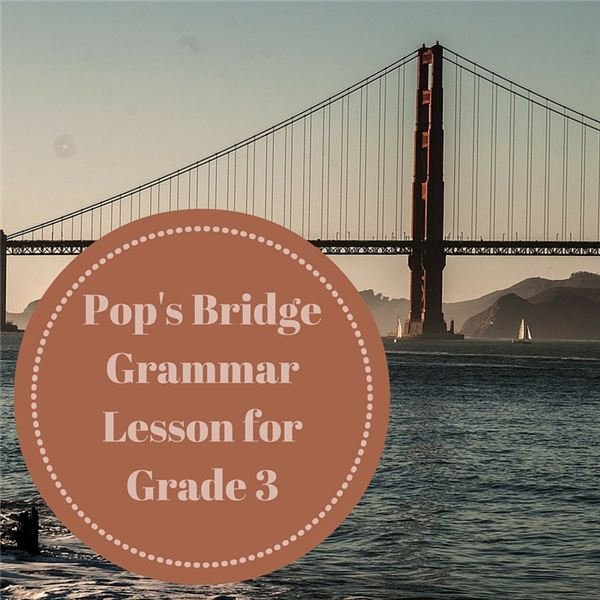Third Grade Grammar Lesson Plan Based on "Pop's Bridge" by Eve Bunting
Objective
Explain the function of nouns, pronouns, verbs, adjectives and adverbs in general and their functions in particular sentences. LA3-L-1-A
Materials and Preparation
- Index cards with one of these words on each card: noun, pronoun, verb, adjective, adverb
- Copies of “Pop’s Bridge” by Eve Bunting (If multiple copies are not available, copy pages 4, 6 and 22.)
Review
- Noun: word that names a person, place or thing
- Pronoun: takes the place of a noun, such as I, me, you, she, he, we, they, it, them, him her
- There are also possessive pronouns such as my, his, hers, theirs, ours.
- Verb: words that show action (Bill runs) or state of being (Susan is here)
- Adjective: describes a noun or pronoun (She received beautiful flowers.)
- Adverb: describes a verb, answers who, when, where, what, how often, how much (He swims daily)
Procedure
Introduce the book “Pop’s Bridge” to the class. Tell students that this is a fictional book, but they will learn about the building of the famous Golden Gate Bridge. Students should pay particular attention to words that the author uses to draw the reader into the story. You may choose to read to the class or call on students to take turns reading aloud.
Reread a few sentences from the book and discuss how the words are chosen so that the reader can fully experience the story.
“And then one day something terrible happens. Charlie and I are watching as the scaffolding pulls away from the bridge. There’s a noise like a train wreck as the scaffolding crashes down into the safety net. The net tears loose and men go with it into the swirling tide.”
Imagine if that passage just said, “The bridge broke and men fell into the water.”
Activity One
Place students in groups of two or three. Provide copies of the pages from the book, paper and pencils. Assign each group to a specific part of speech: noun, verb, adverb, adjective or pronoun. Each group should write down all the words in their category. Students will then share the lists with the class. Do all the words fit into the assigned category?
Activity Two
This can be done with any sentence and at any time to review the parts of speech.
Use the index cards that you have prepared.
For example, write this sentence from the book on the board:
“On foggy days my hands sweat on the binoculars.”
Ask a student to choose a card. Let’s say it is a noun. The student then changes a noun in the sentence. It may be silly or sensible. For example: On foggy days, my feet sweat on the binoculars.
The card goes back in the pile. Then let’s say an adjective needs to be changed. On sunny days, my hands sweat on the binoculars.
Continue having students pick a card and change a word as time allows.
References
- Capital Community College: Definitions of Basic Sentence Parts
- Bunting, Eve. Pop’s Bridge. Harcourt Books, 2006.
